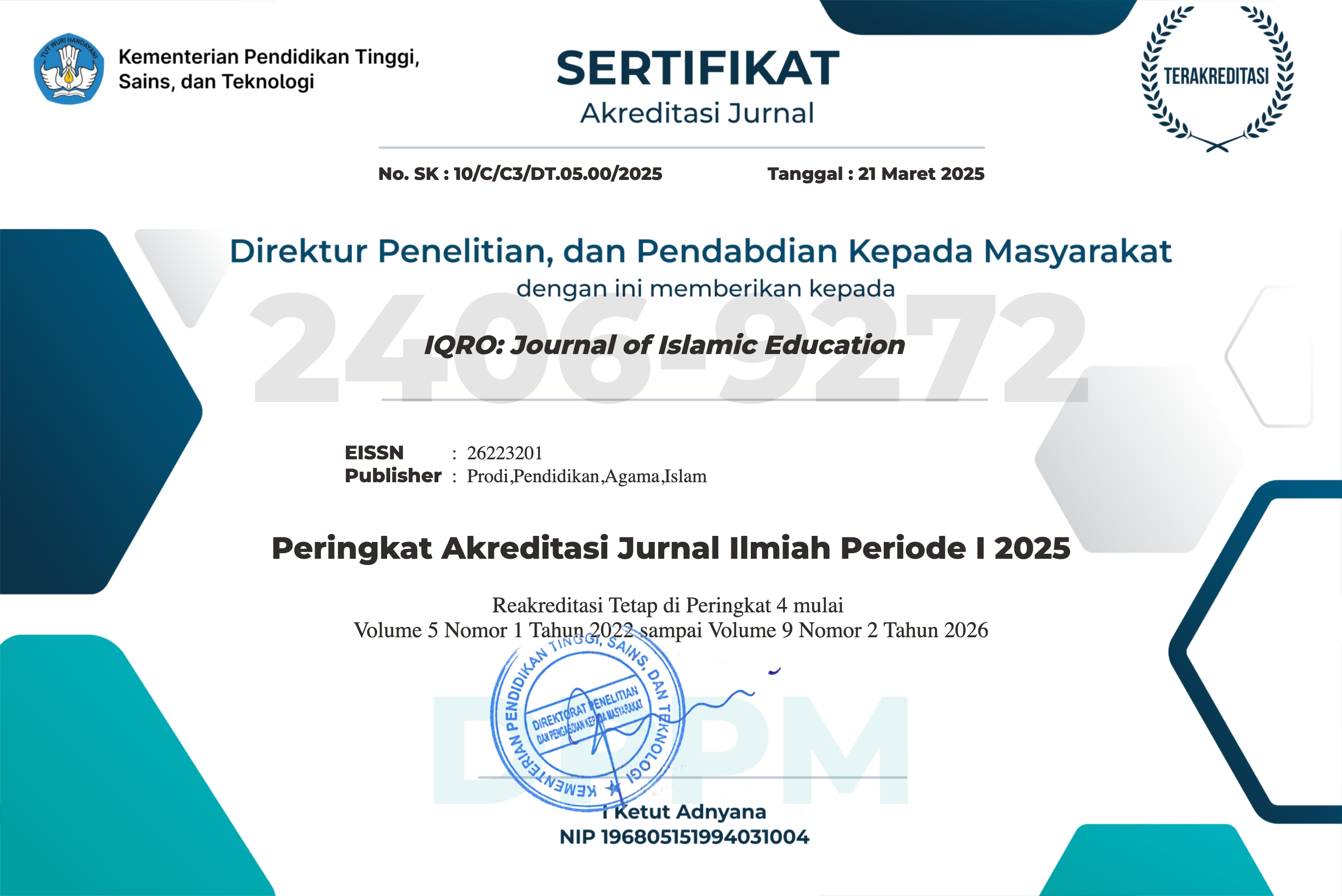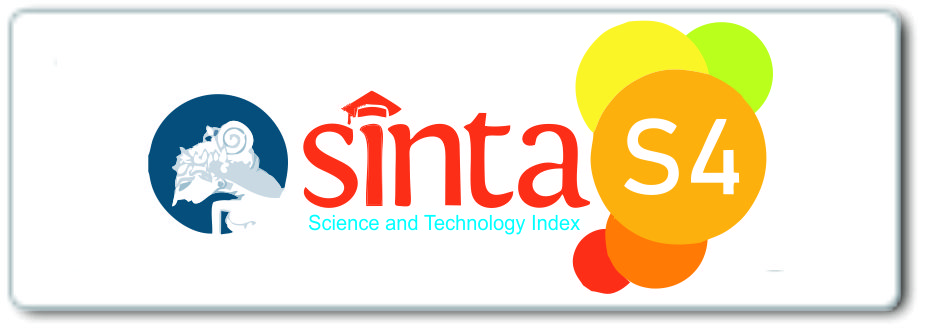Qur'anic Values as a Foundation for Social Change in Modern Society
DOI:
https://doi.org/10.24256/iqro.v7i2.5613Keywords:
Al-Qur'an, social change, modern societyAbstract
The Qur'ān as the holy book of Muslims has a significant role in shaping the social fabric of society. This study aims to explore the relationship between the Qur'ān and social change, focusing on how Qur'ānic teachings influence social transformation in various aspects of life.
This research uses a qualitative method with a thematic interpretation approach that collects relevant verses to explore the relationship between the Qur'an and social change. The primary data sources are Qur'anic verses that explicitly or implicitly discuss concepts related to social change. The Qur'anic verses were selected based on their relevance to themes such as justice, collective responsibility, social care.
The results show that the Qur'an provides a strong ethical foundation for sustainable and equitable social change. Concepts such as amar ma'ruf nahi munkar, social justice and collective responsibility are seen as key drivers in driving positive change in society. In addition, the Qur'an emphasizes the importance of education, tolerance and dialogue between communities as key pillars in dealing with social challenges. These teachings are relevant to apply in the modern context, where society continues to evolve with the challenges of globalization, moral crisis and inequality.
This study concludes that the Qur'an is not only a spiritual guide, but also a practical guide in creating constructive social change. Thus, a deep understanding of the teachings of the Qur'an is needed so that Muslims can actively contribute to an equitable and inclusive social transformation process. This research is expected to enrich the academic discourse on the role of religion in social change and offer new insights into the relevance of the Qur'an in the contemporary socio-cultural context.
References
Adiansyah, Ridho, and Nurul Faezah binti Yahaya. 2023. “Khamr in the Qur’an.” QiST: Journal of Quran and Tafseer Studies (2): 1-17
Ahmad, Anis. 2020. "The Role of Values in Social Change: An Analysis from the Qur’ānic Perspective." Al-Milal: Journal of Religion and Thought 2 (1): 1–36.
Akhmadi, Agus. 2019. "Moderasi Beragama Dalam Keragaman Indonesia: Religious Moderation in Indonesia’s Diversity." Jurnal Diklat Keagamaan 13 (2): 45–55.
Al-Bawwab, Rania Adel. 2023. "Zakat: Changing the Framework of Giving." Islamic Economic Studies 30 (2): 86–103.
Al-Khatib, Mahmoud A. 2023. "The Concept of Justice in Islam." Journal of Ethnic and Cultural Studies 10 (5): 45–66.
Arbia, Giuseppe. 2023. Income Inequality, Redistribution, and Economic Growth. SpringerBriefs in Economics.
Epley, Jennifer L. 2015. "Weber’s Theory of Charismatic Leadership: The Case of Muslim Leaders in Contemporary Indonesian Politics." International Journal of Humanities and Social Science 5 (7): 7–17.
Fazaluddin, Shafi. 2022. Conciliation in the Qurʾan: The Qurʾanic Ethics of Conflict Resolution. Vol. 9. Walter de Gruyter GmbH & Co KG.
Gofman, Alexander. 2019. "Tradition, Morality and Solidarity in Durkheim’s Theory." Istanbul University Journal of Sociology 39 (1): 25–39.
Hussain, Muhammad Nasri Md, Mohd Shahril Ahmad Razimi, and Ahmad Khilmy Bin Abd Rahim. 2021. "A New Dimension of Islamic Corporate Ethics in the Light of Al-Quran and Assunnah." International Journal of Entrepreneurship 25: 1–20.
í Baianstovu, Rúna, and Phillip Ablett. 2020. "The Transformation and Integration of Society: Developing Social Work Pedagogy through Jürgen Habermas’ Theory of Communicative Action." In The Routledge Handbook of Critical Pedagogies for Social Work, 450–64. Routledge.
Jacobson, Tom, and Leanne Chang. 2019. "Sen’s Capabilities Approach and the Measurement of Communication Outcomes." Journal of Information Policy 9: 111–31.
Kader, Haithem. 2021. "Human Well-Being, Morality, and the Economy: An Islamic Perspective." Islamic Economic Studies 28 (2): 102–23.
Khan, Khatib Ahmad, Hafiz Tahir Islam, Syed Shameel Ahmed Quadri, Muhammad Sarwar, Summer Aslam, and Muhammad Ayyoub. 2023. "Islamic Model of Political Economy and Finance and Contemporary Trends of Financial Engagements from Historical Policy Management." Russian Law Journal 11 (4): 781–86.
Mainiyo, Attahir Shehu, and Muhammad Maga Sule. 2023. "Impact of Qur’anic Moral Excellence on the Lives of Muslim Society: An Exposition." Demak Universal Journal of Islam and Sharia 1 (3): 188–205.
Matawang, Salehuddin. 2024. "Quran’s Insight On Human Rights." Journal of Social Science (JoSS) 3 (9).
Okumuş, Ejder. 2020. "Islam, Muslims, and Social Change." Tevilat 1 (2): 479–506.
R’boul, Hamza. 2021. "Alternative Theorizing of Multicultural Education: An Islamic Perspective on Interculturality and Social Justice." Journal for Multicultural Education 15 (2): 213–24.
Sayedahmed, Nael Y. M., and Samir A. Abuznaid. 2019. "Sustainable Development and Social Responsibility from an Islamic Perspective." Journal of Social and Political Sciences 2 (4).
Wadho, Karam Hussain, Roshan Ali, and Zain Ul Abdin. 2019. "English-Islam, Human Rights and Globalization." The Scholar Islamic Academic Research Journal 5 (2): 55–80.
Wilkinson, Richard, and Kate Pickett. 2019. The Inner Level: How More Equal Societies Reduce Stress, Restore Sanity and Improve Everyone’s Well-Being. Penguin.
Yeşilkaya, Nazan. 2022. "John Rawls’ Justice As Fairness: A Political Conception." Darulhadis İslami Araştırmalar Dergisi 3: 318–39.
Zauro, Nurudeen Abubakar, Ram Al Jaffri Saad, and Norfaiezah Sawandi. 2020. "Enhancing Socio-Economic Justice and Financial Inclusion in Nigeria: The Role of Zakat, Sadaqah and Qardhul Hassan." Journal of Islamic Accounting and Business Research 11 (3): 555–72.






 This is an open access article under the
This is an open access article under the 